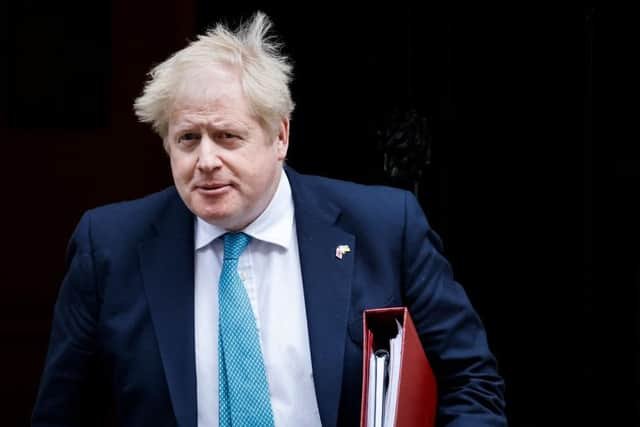Partygate: Labour motion for Commons Privileges Committee to investigate Boris Johnson explained
and live on Freeview channel 276
MPs have agreed to refer Prime Minister Boris Johnson for a parliamentary investigation into whether he lied to the Commons about Downing Street parties taking place during coronavirus lockdowns.
Labour had tabled a motion to refer the Prime Minister to the Privileges Committee over his initial claims that no lockdown rules had been broken.
Advertisement
Hide AdAdvertisement
Hide AdThe decision means MPs on the Privileges Committee will investigate whether Mr Johnson is in contempt of Parliament for misleading the Commons with his repeated denials of lockdown-busting parties in No 10.
The probe will only begin after Scotland Yard has completed its own inquiry into alleged coronavirus law breaches at the heart of Government.
It comes days after Mr Johnson apologised to MPs in the House of Commons over his lockdown party fine, but insisted he did not know he was breaking the rules.
This is what you need to know.


What is the Privileges Committee?
It is a cross-party group made up of seven MPs. The special body is not convened often, but looks at possible breaches of privilege or contempt of parliament.
Advertisement
Hide AdAdvertisement
Hide AdThe group is chaired by Labour MP Chris Bryant, but has a Conservative majority.
Was there a vote?
The vote on the motion was expected to happen at 5pm on Thursday (21 April).
Tory MPs were told they would be given a free vote on Labour’s motion.
The Government had earlier dropped its attempt to delay the vote.
Advertisement
Hide AdAdvertisement
Hide AdThe Labour motion on Thursday passed without a vote after receiving no objections, with No 10 opting against tabling its own delay amendment.
The motion stated Mr Johnson’s comments “including but not limited to” four separate remarks in the Commons “appear to amount to misleading the House”.
What is a free vote?
A free vote, also known as an unwhipped vote, - in parliament is one in which MPs or members of the Lords are not put under pressure to vote a certain way by their party leaders.
The parliament website states: “Free votes have traditionally been allowed on ethical issues that are seen as a matter of conscience.”
Advertisement
Hide AdAdvertisement
Hide AdTory MPs had initially been ordered to back a Government amendment which would defer any decision on referring the matter to the committee until after the conclusion of the Met Police inquiry.
But in a late U-turn shortly before the debate began, they were told they would have a free vote.
Was Boris Johnson there?
No. The Prime Minister is currently out of the country and is on an official visit to India.
Asked on the plane whether he would fight the next general election, the Prime Minister replied: “Of course.”
Advertisement
Hide AdAdvertisement
Hide AdWhen asked whether there were any circumstances in which he would consider resigning, Mr Johnson said: “Not a lot that spring to mind at the moment.
Mr Johnson was unable to escape the scandal during his visit to Ahmedabad, with the issue dominating a round of broadcast interviews.
The Prime Minister insisted he has “absolutely nothing, frankly, to hide” as he explained why he had dropped the attempt to delay a decision on the investigation.
He told Sky News: “People were saying it looks like we are trying to stop stuff. I didn’t want that. I didn’t want people to be able say that.”
Advertisement
Hide AdAdvertisement
Hide AdHe said he remains confident of leading the Tories into the next general election.
What was said during the debate?
Speaking before the result was confirmed, Cabinet Office minister Michael Ellis told the Commons the Prime Minister “has always been clear that he is happy to face whatever inquiries Parliament sees fit”.
Labour deputy leader Angela Rayner said MPs were having to resort to establishing a parliamentary investigation “because the Prime Minister has failed to do the decent thing and resign”.
In a blow to the Prime Minister, former minister Steve Baker, an influential mobiliser on the backbenches, told MPs the Prime Minister “should be long gone”.
Advertisement
Hide AdAdvertisement
Hide AdMr Baker, who was a prominent Brexiteer involved in ousting Theresa May, said: “Really, the Prime Minister should just know the gig’s up.”
William Wragg, Tory chairman of the Public Administration and Constitutional Affairs Committee, used a scathing speech to confirm he had submitted a letter of no confidence in Mr Johnson’s leadership.
“I cannot reconcile myself to the Prime Minister’s continued leadership of our country and the Conservative Party,” he told the Commons.
Comment Guidelines
National World encourages reader discussion on our stories. User feedback, insights and back-and-forth exchanges add a rich layer of context to reporting. Please review our Community Guidelines before commenting.
